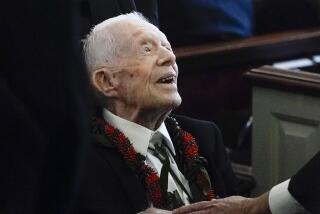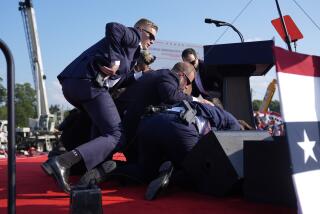Carter Center Points to Hunt for Ex-Presidentsâ Real Role
President Reaganâs generous participation in the dedication of the Carter Presidential Center has again focused attention on the role of our former Presidents.
Of the 38 Presidents through Jimmy Carter, 30 survived their tenures; four were assassinated; four others died in office. Those who survived the presidency lived on for an average of almost nine years.
The former Presidents, and indeed the nation, have groped uncertainly for a proper role.
George Washington was appointed a lieutenant general and commander-in-chief of the armed forces, but had no real duties. He ventured back to the capital only once.
Andrew Jackson moved back to central Tennessee, where his last years were tormented by the debts of his neâer-do-well adopted son.
John Tyler became the chancellor of William and Mary College, held Confederate office and fathered seven more children--the last born when he was 70.
Twenty-six of our Presidents had been lawyers, but only a handful returned to practice after leaving office--Benjamin Harrison and William H. Taft being notable exceptions.
Several ex-Presidents, more than one likes to remember, from Thomas Jefferson to Calvin Coolidge, fell on hard times and became the subjects of private and sometimes public charity.
James Monroe was so impoverished that he had to ask Congress to reimburse him for his expenses in public service. Congress appropriated $30,000.
Ulysses S. Grant founded a brokerage firm, and was left penniless through the fraud of his partners. At the end he was desperately trying to finish his memoirs and provide a legacy for his family before succumbing to throat cancer.
One comes away from even a cursory review of the lives of ex-Presidents with a chilling sense of a wasted resource. On the whole, their experience was undervalued and their advice too little sought.
An important reason for this omission is partisan zeal. New Administrations of both parties have sought to distinguish themselves from their predecessors on each and every front. This ensures a discontinuity that baffles our allies and produces galloping inefficiencies in our system. The irony is that, as a son might regard his father, a new Administration often decides in its waning years that the old man was not so dumb after all.
Nevertheless, at least five former Presidents had illustrious later careers from which lessons may be drawn.
Jefferson presided as the sage of Monticello, and was consulted extensively by Monroe and James Madison. His greatest contributions were in the field of education, notably his intense efforts to found the University of Virginia and to inspire its curriculum and architecture. His financial distress turned to the nationâs advantage when he sold his personal library to replace the books destroyed by the British when they burned the capital in 1814--a collection that is the genesis of todayâs Library of Congress.
John Quincy Adams served 17 years in the House, led the fight to establish the Smithsonian Institution, argued before the Supreme Court and became an outspoken opponent of slavery.
Taft taught law at Yale, was elected president of the American Bar Assn., published lectures on the presidency, served in Woodrow Wilsonâs Administration and later became chief justice.
Teddy Roosevelt explored much of the world, writing about wildlife. He ran for President twice more, wrote influential books and essays and sought authority to raise a volunteer division for World War I.
Herbert Hoover was rediscovered after his arch-rival, Franklin D. Roosevelt, left the scene. Hoover coordinated postwar relief for President Harry S. Truman and chaired two commissions--one appointed by Truman and one by Dwight D. Eisenhower.
These exemplary âpost-presidenciesâ have several important elements in common. Efforts were devoted to a broad public purpose, amplifying an interest derived from the presidency. They faced toward the future--addressing profound interests of posterity, not antiquity. There was also deep personal involvement. These five ex-Presidents did more than lend their names to the cause; they gave themselves.
All of those qualities are reflected in the Carter Presidential Center. Its four contemporary entities--a library, a center for scholarly research, the Global 2000 Inc. project and the Carter-Menil Human Rights Foundation--reflect President Carterâs experience, his personal commitment, his values and his hopes for the future.
Every President, just by having served, has given to the nation beyond his due. We have no right to expect more. Yet the Carter center is a further gift, one of rare quality, representing his devotion to public service. It has no object but the public good.
More to Read
Sign up for Essential California
The most important California stories and recommendations in your inbox every morning.
You may occasionally receive promotional content from the Los Angeles Times.










